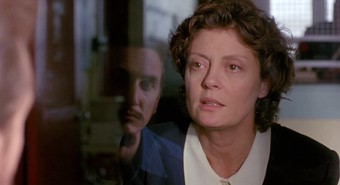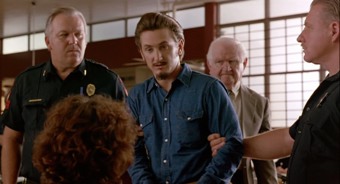|
To
misquote Socrates (or was it Plato?), every story is
only ever told to an audience which already agrees with
its message. If true, the reason why you're reading
this review may well be because, given the editorial
slant of this website, you suspect it might confirm
something for you. It feels good.
This is a bind for filmmakers and every other kind of
storyteller (including reviewers). Dismissing those
filmmakers who seem solely reliant on visual gimmickry
in return for cash, (and such a dismissal is probably
a rallying cry for this site), the principled filmmaker
wants to make a difference. Preaching to the converted
is nice, but ultimately it changes nothing.
So, Dead Man Walking is, in many ways,
a serious attempt to reach across the divide. It tries
to seek out an audience that might not be entirely sympathetic
to its message. The film title and the prison genre
tell us immediately that this is about execution, unless
it's some display of spiritual brilliance. Of course,
in truth it's both, though without the special effects.
If
you're not religious, don't be put off by the churchy
content. This is a political film, in so far as it's
about how we should respond to evil. If you're not political,
don't be put off by the liberal content. This is a spiritual
film, in so far as it pulls no punches about the nature
of evil and the human condition.
Susan
Sarandon won an Oscar for her role as Sister Helen Prejean,
a New Orleans nun whose practical faith leads her to
confront a seriously nasty piece of work. Prejean agrees
to act as Spiritual Adviser to Matthew Poncelet, played
by Sean Penn who was Oscar nominated for the part, and
who is nearing execution for a brutal rape and double
murder.

The
word 'brutal' so often prefixes such crimes, it becomes
almost meaningless. Yet these transgressions are indeed
savagely violent, and explicitly depicted as such. For
every captivating Kung Fu kick, every siren superhero
smack ever committed to celluloid, this is the answer.
This is what violence really looks like. At the very
least, it's unsettling to watch.
Poncelet
is not a nice man. This is reinforced again and again.
He denies the crime, claiming credibly perhaps that
he is the patsy. But his true nature is out there for
all to see. He is devilish looking: cold, dead eyes;
a slick sta-puff quiff and a self-aggrandising goatee.
He has a drawl that kills his words and cuts you open
at the same time. In a news clip of his court conviction,
Poncelet draws his manacled hand across his throat in
a chilling and remorseless threat to his jury.
In
his first meeting with Prejean, he is calculating the
odds, estimating the opportunity to manipulate her naivety.
Poncelet is "Looking for a loophole," and
reckons Prejean can help him find it. He says: "You're
very sincere. You've never done this before… never
been this close to a murderer before," and coldly
watches her reaction, gets his measure of her. Later
he catches the virgin nun off-guard, bringing sex into
their discussion. "We got intimacy right here now
don't we… I like being alone with you. You look
good to me."
During
their meetings, the craft of the film shines. The wire
mesh separating the two characters moves in and out
of focus, obscuring or clarifying how they see each
other. And later on, reflections in glass put their
two faces side by side.
If
the good Sister is innocent, at every turn she is confronted
with hostility and increasing isolation as a result
of her decision to act for Poncelet. The victims' families
pour contempt and rage onto her: "You've brought
the enemy into this house," says one distraught
parent after recounting his daughter's murder in horrifying
detail. And her own close and loving family aren't supportive
either. Her mother is mystified: "Why don't you
help honest people?" Which is a bit like saying
why don't you make films for people who agree with you.
Prison
Chaplain Farley (Scott Wilson) warns her at the outset:
"There's no romance here. No James Cagney 'I've
been wrongly condemned…' They are all con men
and they will take advantage of you every way they can."
In fact the reference to Cagney does hold up. Poncelet
has a family too, and his younger siblings look up to
him every bit as much as the Dead End Kids admire Cagney's
gangster in the 1938 classic Angels With Dirty
Faces.

Executed
or not, what Poncelet believes in matters. This is the
crux. Whatever it is that motivates Poncelet's words
and actions has a knock on effect, whether it's to destroy
lives or to save them by setting an example to others
who follow
This
is Prejean's territory. She confronts his belief system:
"Was your daddy a racist? …You have to teach
a child to hate." And when he admits respect for
Martin Luther King, because he worked hard for what
he wanted, she points out to him that: "It's lazy
people you don't like."
Poncelet
doesn't like it. He tries to keep Prejean's attention
on a Federal Appeal, while she tells him about Jesus:
a rebel who had to be killed because he was so dangerous.
"Like me," says Poncelet. "Not at all,"
says Prejean. "He changed the world with his love.
You watched two children die."
This
is what sets Prejean apart from others. We see that
despite her apparent naivety, she is under no illusions
about who Matthew Poncelet really is. The difference
is her response. She doesn't judge him, nor condemn
him. Just as she questions herself at different points
in the story, she consistently, relentlessly confronts
him with himself.
And
this is the politics of the thing. Our response to evil.
If this is about execution, the language and parameters
of this piece are governed by religious faith. In particular,
a faith that in America, inhabits the political spectrum
in a manner completely alien to any European system,
(ironic given the historical American impulse to escape
political influence over religion). The death penalty
comes up for evaluation but perhaps this isn't really
the major point.
If
the story, which is inspired by true events, shows how
the death penalty changes nothing, it is trying to communicate
that message to an unsympathetic audience in a language
it understands. It argues in its opponents' terms, saying
that belief and faith can and does change things, much
more powerfully, than mere extermination. So what kind
of world do we want?
This
is a pertinent question for our times. It seems odd
perhaps that some of those who advocate a religious
faith are also those who shout loudest for blood. Whether
or not you believe that the appropriate response to
what you fear (whether murderers or terrorists) is to
kill it, this is worth watching. You will be challenged,
either by the message, or the language, or perhaps both.
I
would like to think that in making this film, Tim Robbins
was proving Socrates (or Plato) wrong, and was making
a connection to an indifferent audience, however I doubt
it. But hats off, this is a valiant attempt, and to
be fair, the responsibility is surely on each of us
to challenge ourselves. After all, what's the point
in going to see something you already know you'll like?
It might feel good, but does it change anything?
Framed
at 1.85:1 and anamorphically enhanced, this is a splendid
transfer, sharp without any sign of distracting edge
enhancement, with colours having a very natural appearance
and no sign of over-saturation. Contrast is excellent,
with fine detail in both shadow and white highlights,
sometimes side by side.
The
5.1 mix here makes scant use of the full sound stage,
though given that the film is largely dialogue driven
this never feels like a compromise mix. Talk is largely
confined to the centre speaker, with only some background
effects and the music spreading further afield.
The
key special feature is without doubt the commentary from writer and director Tim
Robbins. A man of considerable political conviction (not
to mention film-making talent), he soberly provides some
excellent background information to the production, from
the use of real locations to subtle changes made to the
original story in order to highlight other issues surrounding
such cases. Detail is provided on the characters and their
interpretation by the actors, whose work inevitably comes
in for praise, as well as the music and the reasons for
its selection. Robbins obviously has a huge amount of
respect for the real Sister Helen, and very eloquently
and intelligently puts the anti-death penalty case, remarking
that you need to be able to see and understand both sides
of the argument to be truly opposed to it. There are a
few dead spots, but this is largely a very fine, very
informative track.
The theatrical trailer (2:28) is presented
4:3 but in fine shape. It gives a fair flavour of the
film, though covers a bit more of the story than I'd prefer
to know if I hadn't seen it.
The original release TV commercial (0:31) is essentially a compressed version of the
above, laced with positive press quotes.
An
extraordinarily humanist and even-handed look at a subject
that tends to polarise opinion, Robbins' powerfully performed
and beautifully crafted film presents its arguments persuasively,
emotionally and intelligently, but never as a one-sided
polemic.
MGM's
DVD has a great picture and a very informative commentary
track, and considering the disk can now be picked up for
£7 on-line this represents solid value. Highly recommended.
|